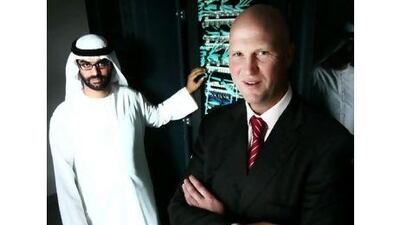ABU DHABI // In the 1990s, as the internet started to become uncomfortably congested, a group of US universities and government entities created a separate, faster network solely for the purpose of research.
Thousands of times faster than a typical broadband connection, Internet2 has broadened the information superhighway for the most bandwidth-hungry projects: moving huge amounts of data for research, broadcasting live surgeries and even allowing an orchestra to collaborate on a symphony from their homes.
Now, UAE researchers are developing a National Research and Education Network (NREN) of their own that would run separately from an internet bogged down by billions of devices and commercial traffic.
Ankabut ("spider") will not only connect major universities and research institutions to each other, but to their international counterparts.
An Internet2 connection will also give the world better access to the country's research, which academics and experts complain gets little visibility.
The network, launched by Khalifa University for Science, Technology and Research (Kustar), currently threads together the campuses of Kustar, UAE University, Zayed University, the Institute of Applied Technology, the Higher Colleges of Technology, Fatima College of Health Sciences and the American University of Dubai, all through a network of high-speed fibre-optic links.
Paris-Sorbonne University Abu Dhabi, NYU Abu Dhabi, The Petroleum Institute, Al Hosn University and Tawam Hospital have all expressed interest in connecting.
The hope is that the network will eventually link all local universities, government departments, public libraries, health service centres, museums and some private research companies.
The services will not necessarily be exclusive to the sciences, said Steven Winstanley, acting chief operations officer for the non-profit organisation behind the plan.
"This could not only be used to assist geologists working with seismology, but also with famous composers and violinists," he said.
"This can help scientists or medical students get and manipulate models that have detailed, accurate dimensions that have not been available in the past. It could change the way research is done here."
Ankabut's core network will be able to hold 10 gigabits a second (Gbps) of data - about 2,000 times faster than home broadband. Research cycles that would typically take months of number crunching between institutions will be reduced to days using the Ankabut links, officials said.
Kustar is providing a quarter of the funding, with the rest coming from the Information and Communication Technology (ICT) Fund, a government venture initiated by the Telecommunications Regulatory Authority, the UAE's internet regulator.
Etisalat is providing the backbone for the network, with underwater fibre-optic cable connecting Fujairah to an Internet2 router in New York and via that to other national research networks such as Britain's Janet and Europe's Dante. Ankabut will also provide a link to EUN/Enstinet in Egypt and Qatar's FN among other networks.
"This extra capacity, speed and storage will allow more researchers to be connected, find each other and collaborate on an international level," said Badr Hubais, manager of service development for Ankabut. "It will allow for better exposure to the country's research capabilities."
Academics have said they struggle to gain international recognition for their work unless they publish it in collaboration with institutions overseas, while peer-reviewed journals are not listed on highly visible indices used by scientists worldwide.
Ankabut could help change that, say university officials. "With Etisalat or these other normal providers, there is just not enough capacity to handle all of the research people want to do," said John Rogan, the Petroleum Institute's head librarian.
"The amount of research being done in the UAE is not very great at the moment, so anything that encourages collaboration with scientists overseas or access to particular libraries and databases could be the help the country needs."
Constantin Vaduva, director of infrastructure and core services for UAE University, said staff there have already started using Ankabut for video conferencing overseas and are exploring options for other applications.
Local researchers will be conducting a clinical epidemiology study with international experts through the network later this year, he said.
Abdulla al Zaabi, a researcher for the Etisalat BT Innovation Centre (Ebtic) housed at Kustar, has used Ankabut to continue his research on high-performance computing, which started at the University of Manchester in England.
As a result, two papers are being published in Britain based on research he did from the UAE.
Before the high-speed network was available, he said, he was forced to use e-mail and other more limited means to communicate, and as a result felt paralysed in his work.
"I was not able to run experiments through the machines or do simulations, or work alongside supervisors with knowledge in the UK, so it was rather hard," he said.
"Working from the UAE, there are limitations and the resources for simulations are not there, and that is true across disciplines.
"In this way, I have access to other universities' resources and can get engaged in cutting-edge research at a number of other institutions."

